
[ad_1]
The new Google AI search engine will get proper to the purpose: You ask a query, it solutions (albeit generally with inaccuracies). And you are able to do it with no need to scroll down previous all of the adverts, promoted responses, and different cruft to see what issues.
It could seem to be a pithy response, however that’s the actual good thing about the brand new Google Search, the AI version, aka the Search Generative Experience (SGE). PCWorld was provided an opportunity to go hands-on with Google’s new AI search expertise, and we got here away (largely) impressed. It’s a richer expertise than what Microsoft’s Bing Chat offers.
Google permits you to enroll in the SGE through its Search Labs, accessible through the Chrome desktop browser, or Chrome for Android and iOS. You’ll want to affix a waitlist, the identical means Microsoft provided a waitlist for Bing Chat.
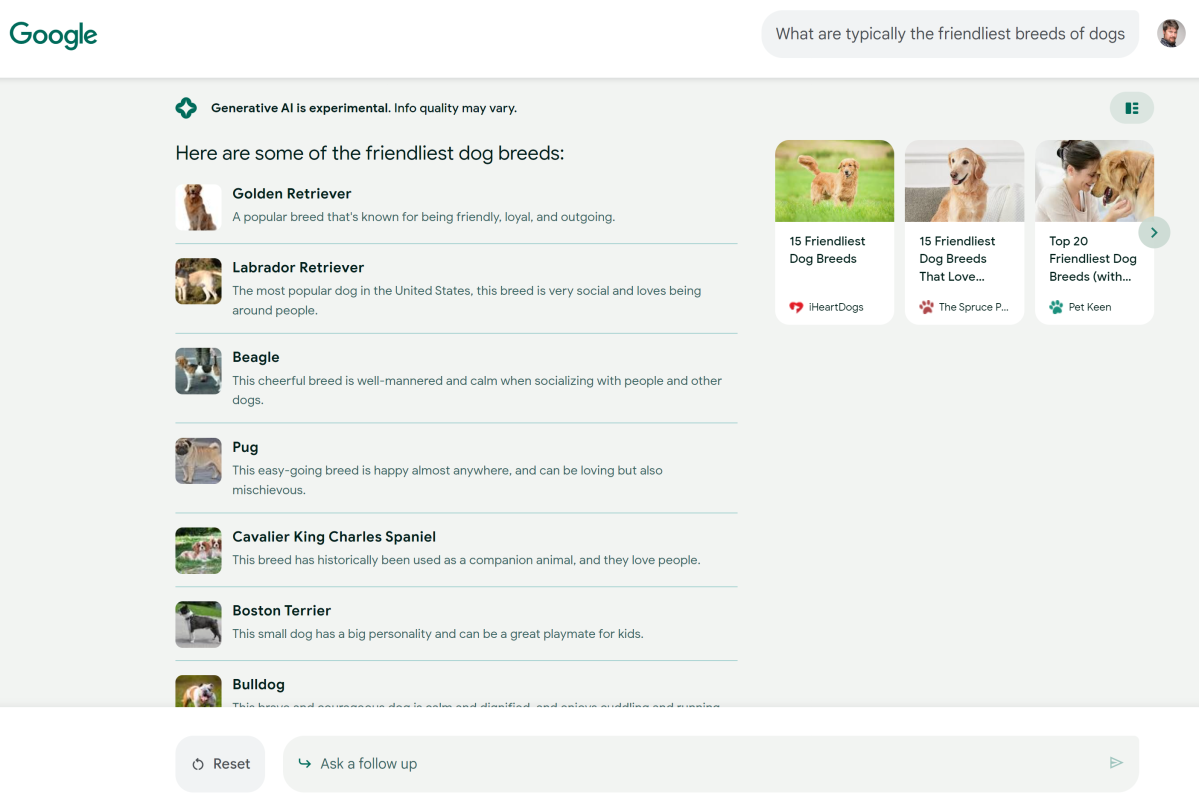
Mark Hachman / IDG
How is the brand new Google search? Mostly for the higher, although publishers ought to nonetheless fear about Google snatching much more eyeballs than than it already does. But Google (like Bing) makes an actual effort to reply the query you pose to it instantly, however with extra element than what Bing presents and an invite to comply with up.
The smartest thing, although, is just this: It will get proper to the purpose. That’s the best way Google was, many years in the past. Over time, although, the outcomes to your question are competing with adverts and sponsored outcomes, playing cards, and all type of middling-to-useless data that merely distracts from what you’re looking for. Google’s new AI search treats your query the best way PCWorld treats its critiques: with a clear, direct presentation summarizing related data, resembling professionals, cons, costs and extra.
How Google Search’s AI handles queries
Google subtly encourages you to “ask” a query and any follow-ups, however you don’t must: Search for merely “Morocco” and also you’ll obtain a Wikipedia-like sequence of 4 paragraphs or so explaining the important thing factors. Ask a query (“is Maui better than Oahu?”) and also you’ll obtain an analogous response, however with the professionals and cons of every. The latter are the next-level contextual questions content material creators normally attempt to reply, as a result of search traditionally can’t.
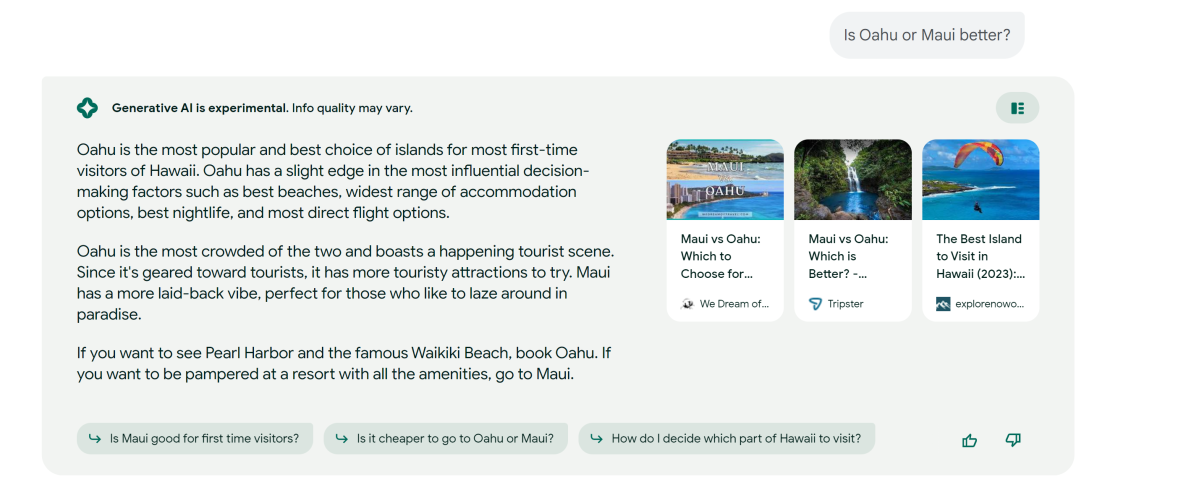
Mark Hachman / IDG
In each contexts, Google declines to footnote its data as Bing does, however consists of two or three small “cards” to the proper, contained in the search response field. Like Bard, Google’s formal AI chatbot, Google’s AI search suggests just a few follow-up questions. Underneath all this, should you can scroll down far sufficient, are the listing of conventional hyperlinks.
If you ask a shopping-related query (“what’s the best gaming laptop under $1,000?”) Google supplies a number of extra playing cards, in a column hierarchy, with far more detailed details about the professionals and cons of every. It appears to be like very very like a standard site or perhaps a journal format, and goes far past the competitors in presenting wealthy, although bite-sized, details about every product. Click the cardboard, and a sidebar pushes out from the facet of the search field, with much more hyperlinks and particulars.
Google’s new AI search does appear to trace follow-up queries. A disclaimer claims that it’s going to retailer your question data for twenty-four hours, so that you simply don’t must consistently resubmit your questions.
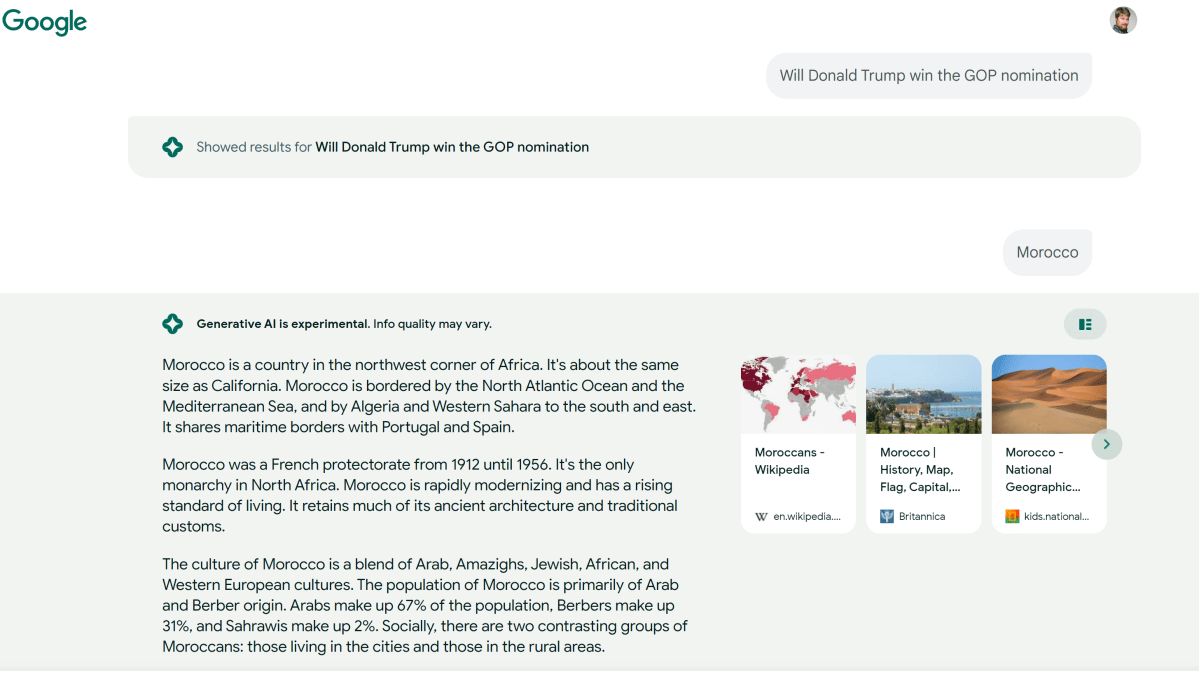
Mark Hachman / IDG
Is Google’s AI search correct?
Not solely. Still, it’s higher than our earlier experiments with Bard, which flubbed a substantial number of the details of Google’s personal Pixel Fold and Tablet.
Google doesn’t actually hassle with the now-almost-traditional warnings that AI can generate imprecise outcomes. Instead, its disclaimer is that “Generative AI is experimental. Info quality may vary.”
And it does differ. Remember that AI chatbots can’t be trusted to give fully accurate answers, regardless of how assured the presentation appears.
To its credit score, Google did an excellent job in presenting the main points of its personal Pixel Tablet and Fold, when Bard couldn’t. Factually, a fast test of its outcomes appeared to match the “traditional” Google search.
But it was when Google’s AI turned “helpful” that it bumped into hassle.
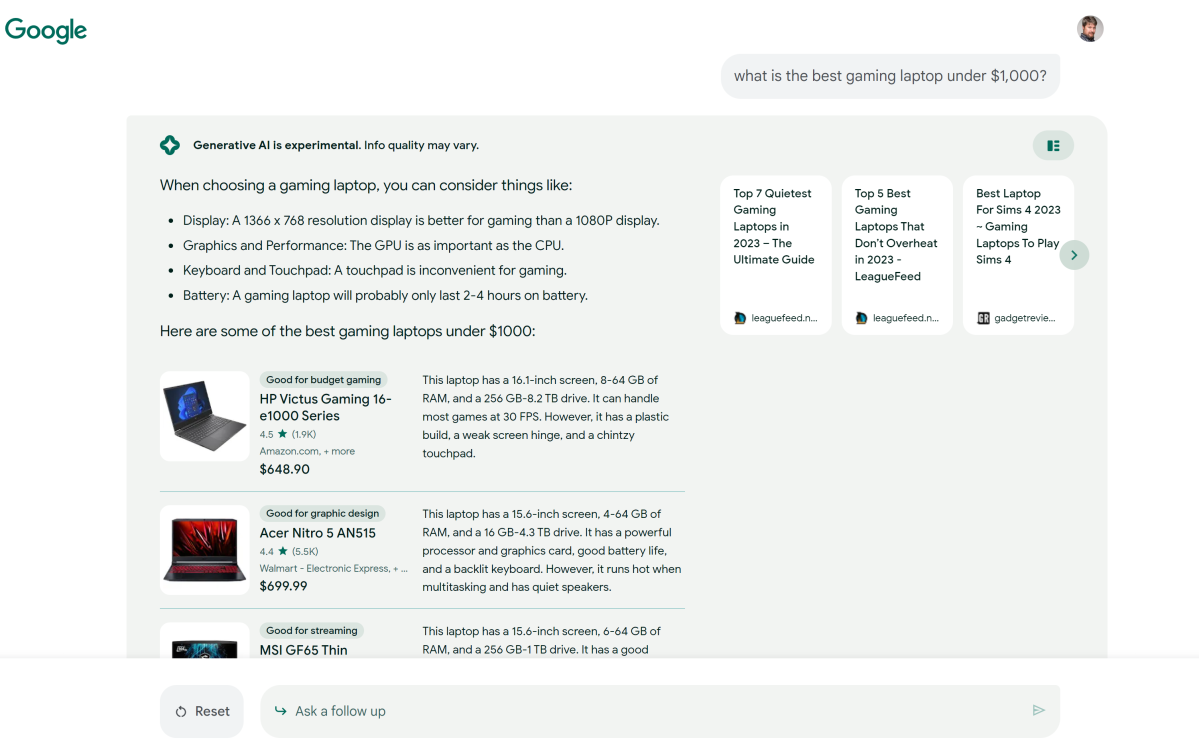
Mark Hachman / IDG
A working example: “When choosing a gaming laptop, you can consider things like [the] display: A 1366 x 768 resolution display is better for gaming than a 1080P display,” it returned, when requested about gaming laptops underneath $1,000. We’d disagree with that, and also you in all probability would, too.
When requested to summarize the HP Victus 16-e1000 Series gaming laptops, Google’s AI search replied: “This laptop has a 16.1-inch screen, 8-64 GB of RAM, and a 256 GB-8.2 TB drive. It can handle most games at 30 FPS. However, it has a plastic build, a weak screen hinge, and a chintzy touchpad.”
That’s an ideal abstract, with a wealthy, concise mixture of particulars. But in response to HP, the Victus 16-e1000 consists of 8-32GB of RAM and between 256GB and 1TB of storage, not 8.2TB. And but, having reviewed an earlier Victus, I’d agree with the opposite factors.
Again, I do like the truth that the brand new AI-powered Google search tries to reply the query. I nonetheless discovered myself wishing for the richness and the thoughtfulness of nicely, people. In asking Google to check Maui and Oahu, I discovered this response to be extra considerate, entertaining, and educated. Google particularly architected Google Search not to show character, not like Bing. Google additionally refuses to decide to selecting one alternative over one other. Humans do.
Enjoy it when you can
That will possible be the crux of the love/hate relationship with AI search—immediacy of solutions versus character and a human contact.
For publishers, the difficulty is that this: In a standard search engine, you enter your question on the prime of the web page, and Google, Bing, DuckDuckGo, or whoever merely publishes an inventory of outcomes. Add a brand new question, and also you get a brand new listing.
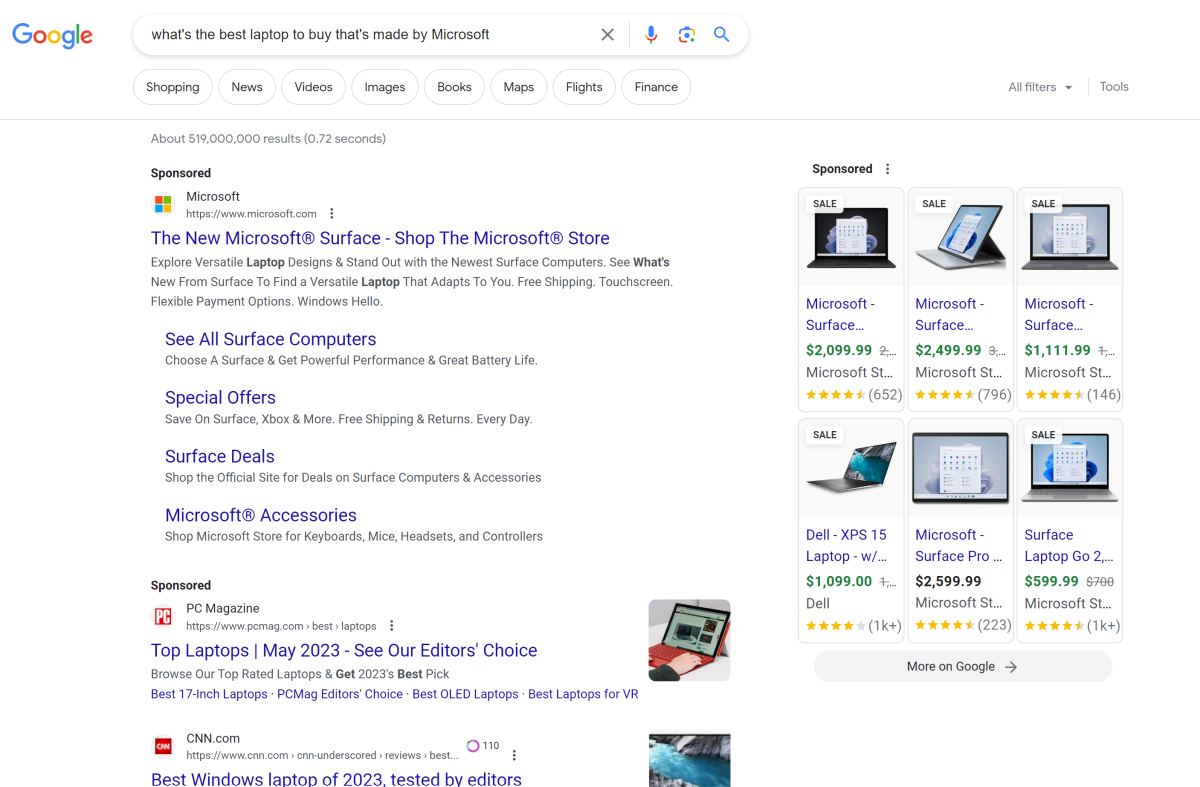
Mark Hachman / IDG
With Google’s new AI Search, all the questions and Google’s responses stack, so the web page merely will get longer and longer—and any conventional textual content hyperlinks that Google supplied for earlier responses disappear. (The small “card” hyperlinks stay.) Bing’s search web page (not Bing Chat, however precise Bing search) feels a lot friendlier to conventional publishers. Unless you’re a service provider, Google’s strategy to the remainder of the online feels far more conceited and cursory.
If you’ve been round tech lengthy sufficient, you realize that corporations bend over backwards through the first few weeks and months to make sure that nothing will get in the best way of an optimum consumer expertise. That’s after they hook you. There can be a time, in all probability, when Google works via accuracy points to current you with a coherent AI search expertise.
Enjoy that point when you can. For now, Google’s new AI Search is a good, trendy refresh of Google Search. But it’s possible solely a matter of time earlier than this refresh turns into as cluttered with junk as “traditional” Search.
Further studying: AI chatbots aren’t search engines. They’re crypto bros.
[adinserter block=”4″]
[ad_2]
Source link